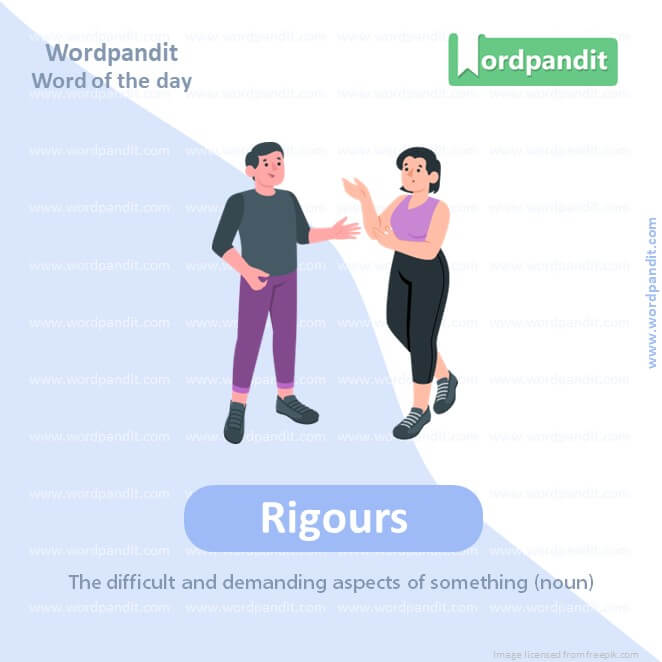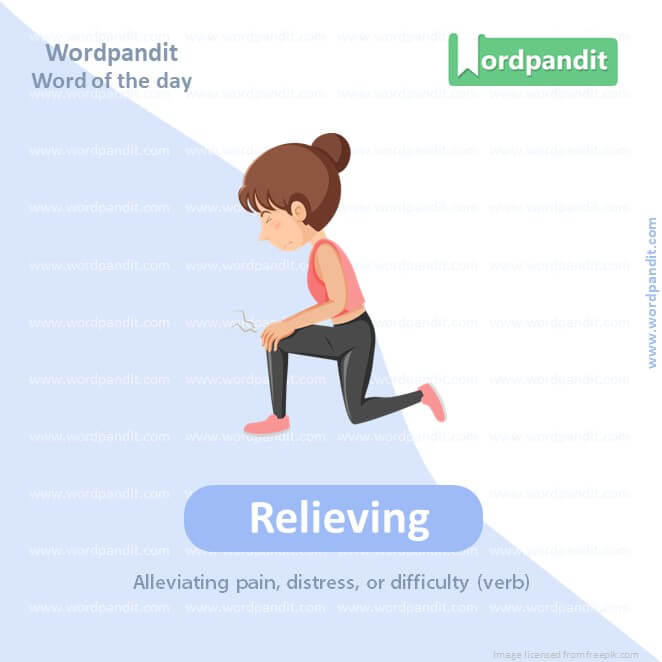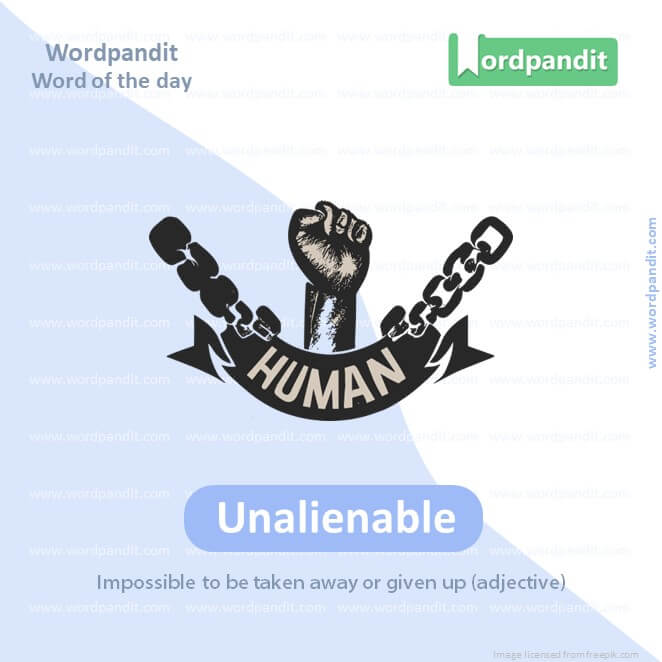Daily Vocabulary Words: List of Daily Used Words in Leading Indian Newspapers
Hi there. Welcome to this special section @ Wordpandit. Our endeavour here is straightforward: highlighting daily vocabulary words that you would come across in leading newspapers in the country. We have included the following newspapers in our selection:
• The Times of India
• The Economic Times
• Hindustan Times
• Mint
• Indian Express
We are putting in extensive work to develop your vocabulary. All you have to do is be regular with this section and check out this post daily. This is your repository of commonly used words; essentially, we are posting a list of daily used words. Hence, this has significant practical application as it teaches you words that are commonly used in leading publications mentioned above.
Visit the website daily to learn words from leading Indian newspapers.

WORD-1: Unbridled
CONTEXT: The executive enjoys unbridled powers to assume international obligations sans parliamentary approval.
SOURCE: Indian Express
EXPLANATORY PARAGRAPH: Imagine a horse that has no bridle, which is a kind of strap that helps control it. When we say something is “unbridled,” it’s like the horse running free without anything holding it back. It means someone or something is really free and wild, not controlled or limited in any way.
MEANING: Free from any form of control and thus acting without restraint (adjective).
PRONUNCIATION: un-BRY-duld
SYNONYMS: Unrestrained, Uncontrolled, Uninhibited, Unchecked, Rampant
USAGE EXAMPLES:
1. Her unbridled enthusiasm for the project was infectious.
2. The party was full of unbridled joy.
3. His unbridled ambition led him to work day and night.
4. The debate was marked by unbridled passion from both sides.

WORD-2: Delineated
CONTEXT: Those international obligations assumed by the executive in exercise of the powers delineated under section 90 of the IT Act must.
SOURCE: Indian Express
EXPLANATORY PARAGRAPH: Think about drawing a picture with clear lines. “Delineated” means making something clear by describing or showing it carefully and in detail, like drawing the outline of a shape so everyone knows what it is.
MEANING: Clearly described or portrayed in detail (verb).
PRONUNCIATION: dih-LIN-ee-ay-tid
SYNONYMS: Outlined, Defined, Described, Depicted, Demarcated
USAGE EXAMPLES:
1. The boundaries of the property were clearly delineated.
2. The report delineated the steps necessary for the project.
3. Her responsibilities at work were well delineated.
4. The artist delineated the landscape with great precision.

WORD-3: Rigours
CONTEXT: The executive to alter or vary the provisions of the IT Act must withstand the rigours of the constitutional and statutory requirements.
SOURCE: Indian Express
EXPLANATORY PARAGRAPH: “Rigours” is like when something is really hard or strict. Imagine having to do exercises in very cold weather; that’s tough and strict, right? That’s what rigours means – things that are hard to do and need a lot of effort.
MEANING: The difficult and demanding aspects of something (noun).
PRONUNCIATION: RIG-ers
SYNONYMS: Hardships, Severities, Strictness, Challenges, Demands
USAGE EXAMPLES:
1. She endured the rigours of training to become an athlete.
2. The rigours of the journey tested their endurance.
3. Students often face the rigours of academic life.
4. The job requires one to adapt to the rigours of outdoor work.

WORD-4: Relieving
CONTEXT: These treaties facilitate mutual trade and investment, and help in relieving double taxation of income.
SOURCE: Indian Express
EXPLANATORY PARAGRAPH: Imagine you have a heavy backpack, and someone takes it off your back. That’s like “relieving.” It means to make pain or a problem less or go away, like helping someone feel better when they are sad or hurt.
MEANING: Alleviating pain, distress, or difficulty (verb).
PRONUNCIATION: ree-LEEV-ing
SYNONYMS: Easing, Alleviating, Reducing, Lessening, Mitigating
USAGE EXAMPLES:
1. The medicine was effective in relieving her headache.
2. He played music for relieving stress.
3. The new assistant was helpful in relieving the workload.
4. Deep breathing exercises are good for relieving anxiety.

WORD-5: Unalienable
CONTEXT: They are endowed by their Creator with certain unalienable Rights.
SOURCE: Indian Express
EXPLANATORY PARAGRAPH: “Unalienable” is a big word that means something very special that cannot be taken away or given up. It’s like saying your birthday is yours and nobody can take it away. It’s something very important that you always have.
MEANING: Impossible to be taken away or given up (adjective).
PRONUNCIATION: un-AY-lee-un-uh-bul
SYNONYMS: Inalienable, Undeniable, Absolute, Irrevocable, Permanent
USAGE EXAMPLES:
1. Freedom of speech is an unalienable right.
2. Every person is born with unalienable human rights.
3. The Constitution protects our unalienable liberties.
4. He believed in the unalienable right to pursue happiness.
WORD-6: Proclamation
CONTEXT: The year in which Lincoln issued his Emancipation Proclamation freeing slaves.
SOURCE: Hindustan Times
EXPLANATORY PARAGRAPH: Think of someone making a big announcement in front of a lot of people, like when a teacher tells the class about a field trip. “Proclamation” is like that. It’s a way of officially announcing something important.
MEANING: A public or official announcement, especially one dealing with a matter of great importance (noun).
PRONUNCIATION: prok-luh-MAY-shun
SYNONYMS: Announcement, Declaration, Edict, Decree, Announcement
USAGE EXAMPLES:
1. The government issued a proclamation about the new law.
2. The king’s proclamation was read in all the villages.
3. The proclamation declared a national holiday.
4. The mayor made a proclamation about the city’s plans.
WORD-7: Damning
CONTEXT: This is a pretty damning image. Nobody who goes to a restaurant, let alone an expensive one, should have all of his or her power taken away.
SOURCE: Hindustan Times
EXPLANATORY PARAGRAPH: Imagine someone showing a picture that proves someone did something wrong. “Damning” is like that. It means something is strong proof or makes it seem like someone or something is really bad or guilty.
MEANING: Showing evidence of someone’s guilt or badness (adjective).
PRONUNCIATION: DAM-ning
SYNONYMS: Incriminating, Condemning, Accusatory, Denunciatory, Indicting
USAGE EXAMPLES:
1. The report contained damning evidence against the politician.
2. His silence was damning.
3. The witness gave a damning testimony.
4. They found damning proof of the crime.
WORD-8: Ebullience
CONTEXT: We had no say in the food but it was served with such ebullience by Massimo Bottura.
SOURCE: Hindustan Times
EXPLANATORY PARAGRAPH: Imagine being so happy and excited that you want to jump around and laugh a lot. That’s “ebullience.” It means showing excitement, happiness, and energy.
MEANING: The quality of being cheerful and full of energy (noun).
PRONUNCIATION: ih-BUL-yuhnss
SYNONYMS: Exuberance, Enthusiasm, Cheerfulness, Vibrancy, Liveliness
USAGE EXAMPLES:
1. Her ebullience was contagious at the party.
2. The child’s ebullience lit up the room.
3. He approached his new job with ebullience.
4. The team’s ebullience after the win was evident.
WORD-9: Dovetailing
CONTEXT: The local economy would have benefitted, he said, dovetailing his critique with his government’s ‘Vocal for Local’ economic philosophy.
SOURCE: Times of India
EXPLANATORY PARAGRAPH: Imagine two puzzle pieces fitting perfectly together. “Dovetailing” is like that. It means two things fitting or working together really well, like when you play a game with a friend and you both know exactly what to do.
MEANING: Fitting together harmoniously (verb).
PRONUNCIATION: DOHV-teyl-ing
SYNONYMS: Interlocking, Connecting, Meshing, Corresponding, Complementing
USAGE EXAMPLES:
1. Their skills dovetailing perfectly, the team succeeded.
2. The two theories dovetailing gave a clearer understanding.
3. Dovetailing efforts led to the project’s success.
4. Her ideas dovetailing with his led to great collaboration.
WORD-10: Sartorial
CONTEXT: Think of Silicon Valley and its sartorial rupture from traditional corporate America.
SOURCE: Times of India
EXPLANATORY PARAGRAPH: Think of someone dressed in really fancy clothes, looking very stylish and neat. “Sartorial” is a word that talks about clothing, especially good and fancy clothing. It’s like saying, “Wow, you look really stylish and well-dressed!”
MEANING: Relating to tailoring, clothes, or style of dress (adjective).
PRONUNCIATION: sar-TOR-ee-ul
SYNONYMS: Stylish, Fashionable, Tailored, Dressy, Elegant
USAGE EXAMPLES:
1. He was known for his sartorial elegance.
2. The event demanded a high sartorial standard.
3. She took a sartorial risk with her outfit.
4. The magazine features sartorial tips for readers.
vocabulary pronounce
The art of communication opens up a world of opportunities. However, to glide smoothly through this realm, it is crucial to not only understand the ‘vocabulary pronounce’ but also to exercise precision when using it. The task of acquiring a rich vocabulary and impeccable pronunciation might seem daunting, but there are proficient ways to conquer this hurdle.
While individuals may have a vast vocabulary, it is the ‘vocabulary pronounce’ that truly dictates the overall clarity and comprehension of their messages. Pronunciation is the essence that brings the words, the bricks in the wall of language, to life. Hence, learning proper pronunciation is vital for anyone aiming to achieve excellence in any language.
When delving into ‘vocabulary pronounce’, one should adopt an interactive and immersive approach rather than a theoretical one. Listening and practicing are pillars to gain command over the ‘vocabulary pronounce’. A balance of both can go a long way in improvising and refining one’s language skills. So, it’s advisable to regularly listen to podcasts or watch videos featuring native speakers. These mediums are a treasure trove of right pronunciation, intonation, and pause.
An excellent way to approach learning ‘vocabulary pronounce’ is also to break down complicated or lengthier words into smaller, manageable bits. By doing this, each syllable can be enunciated accurately, promoting correct pronunciation. This technique can significantly reduce the intimidation of difficult words and enhance a learner’s confidence and fluency.
Remember, ‘vocabulary pronounce’ is a lifelong journey and not a destination. Hence, investing time for consistent practicing, learning new words, and understanding their correct pronunciation should be part and parcel of one’s daily routine. Technology, with its various apps and programs, is a helpful ally in this quest.
To conclude, understanding and mastering ‘vocabulary pronounce’ are indeed challenging feats but with the right strategies and diligent practice, they are readily achievable, leading to robust language skills and heightened communication abilities.













